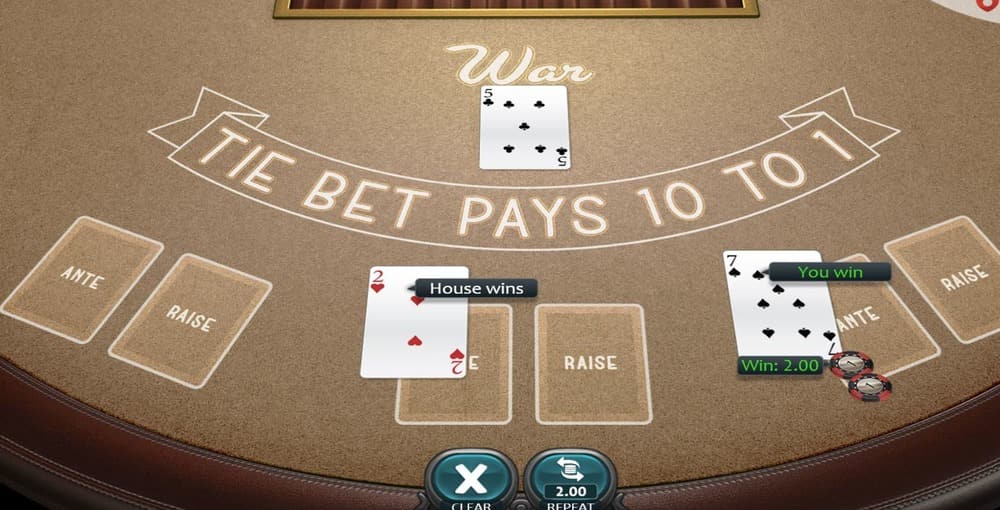
Casino War combines simplicity with the excitement of direct competition between players and the dealer. With roots in a childhood card game, it has transformed into a popular casino offering that appeals to a wide range of gamblers. This guide covers everything from its history and gameplay mechanics to practical strategies and frequently asked questions. By the end, you’ll understand how to navigate this unique game and make the most of your time at the table.
Brief History
The origins of Casino War can be traced back to the 20th century, specifically the 1970s. It was the brainchild of an innovative casino director who sought to cater to a specific clientele – those who craved a more straightforward and dynamic game without the need for complex strategies. This visionary individual created the game known as “War,” which later evolved into the Casino War we know and love today.
It originally became known as a children’s card game that was played without any monetary stakes. However, as the game made its way into casinos, the addition of betting elements transformed it into an exciting gambling option. By the 1990s, with the rise of online casinos, it found its virtual home, appealing to both seasoned casino enthusiasts and fans of the classic childhood game.
Elements of Casino War
At the heart of this game lies a simple yet captivating setup that combines the familiarity of a standard deck of cards with the thrill of strategic betting. Let’s delve into the core elements that make this game a casino favorite.
The Deck
Casino War typically uses six standard 52-card decks. However, this number can vary from one to eight, depending on the casino.
- Why Multiple Decks? Casinos use multiple decks to maintain game continuity and reduce predictability. This ensures a steady flow of gameplay while adding an extra challenge for players trying to track cards.
Card Ranks
The ranking of cards follows the traditional hierarchy found in poker games like Texas Hold’em:
| Rank | Cards |
|---|---|
| Highest | Ace |
| King | |
| Queen | |
| Jack | |
| 10, 9, 8, 7, 6, 5, 4, 3 | |
| Lowest | 2 |
It’s important to note that face cards (King, Queen, and Jack) have distinct values, with the King outranking the Queen, and the Queen outranking the Jack. Additionally, the suit (hearts, diamonds, clubs, or spades) plays no role in determining the card’s rank.
The Bet
Before any cards are dealt, players must place their wagers. Here’s how this works:
- Betting Limits: Casinos set minimum and maximum limits, which vary by table.
- Flexibility: Players can adjust their bets according to their bankroll and risk tolerance.
This initial wager creates the foundation for each round, and in our experience, managing wagers wisely is key to sustaining gameplay over time.
The Deal
Once the bets are placed, the dealer swiftly distributes one card face-up to each player and themselves. The anticipation builds as the cards are revealed, determining the outcome of the round. If a player’s card outranks the dealer’s, they win an even payout on their bet. If the dealer’s card is higher, the player’s wager is lost.
How to Play Casino War
Now that we’ve covered the main elements of Casino War, it’s time to move on to the gameplay itself. Here’s a detailed breakdown of how the game works.
Game Setup
The game is played at a table designed for up to six players and a dealer. Each player competes individually against the dealer, with no interaction between players. Before the game begins, players place their bets within the table’s betting limits.
Playing a Hand
A round of Casino War follows these steps:
- Placing Bets: Players place their wagers before any cards are dealt.
- Card Distribution: The dealer deals one card face-up to each player and one to themselves.
- Comparing Cards: The player’s card is compared to the dealer’s card:
- Player Wins: The player’s card is higher, and they receive an even payout on their bet.
- Dealer Wins: The dealer’s card is higher, and the player loses their bet.
- Tie: The cards are of equal rank, leading to a decision phase.
Decision Phase: Handling a Tie
When the cards tie, the player must choose between two options:
| Option | Outcome |
|---|---|
| Surrender | The player forfeits half of their initial bet and ends the round. |
| Go to War | The player doubles their original bet to continue. The dealer burns three cards and deals new cards. The higher card wins. |
If the player wins the war, they receive an even payout on the original bet, and the war bet is returned. Losing the war results in the loss of both bets.
Optional Tie Bet
Casino War offers an optional side bet, the “Tie Bet,” which allows players to wager on a tie occurring. This side bet is placed before the cards are dealt and pays out at higher odds. However, the probability of success is low, making it a high-risk option. an optional side bet known as the “Tie Bet.” By placing a separate wager on this bet, you’re essentially betting that the next cards dealt in the war round will result in another tie. While the odds are stacked against you (with a house edge of around 18%), a winning Tie Bet pays out a tempting 10 to 1 on your wager.
Understanding the Odds
One of the allures of Casino War is its simplicity, but don’t let that fool you into thinking it’s a guaranteed path to riches. Like any casino game, the house enjoys a built-in advantage, albeit a relatively small one in this case.
The house edge is approximately 2.9% when players opt to “go to war” during a tie. However, this edge increases to a staggering 18.56% if players choose to make the optional “Tie Bet.” It’s crucial to understand these odds and factor them into your decision-making process.
Practical Tips for Playing Smarter
In our experience, Casino War may appear to be a straightforward game of luck, but a few strategic approaches can help improve your chances and make gameplay more enjoyable. These strategies won’t eliminate the house edge, but they can help you manage your bets and make more informed decisions.
1. Avoid the Tie Bet
Our analysis shows that the Tie Bet, despite its attractive 10:1 payout, carries a significant house edge that makes it one of the riskiest options in Casino War. In our view, it’s best to stick to the main game and avoid chasing high-risk payouts. By focusing on the core mechanics, you maintain more control over your bankroll.
2. Go to War
When a tie occurs, we usually recommend opting to “go to war” rather than surrendering half your bet. While the house edge increases slightly during the war round, it is still lower than the surrender option, which carries a 3.7% disadvantage. In our experience, choosing war adds an element of excitement while keeping potential losses manageable.
3. Pay Attention to Card Frequencies
Although Casino War is largely a game of chance, monitoring the frequency of high-value cards like aces can provide a slight psychological edge. If it feels like high-value cards haven’t appeared for a while, you might anticipate their arrival in upcoming rounds. While not statistically reliable, this approach can add a layer of engagement to the game.
FAQs
Is Casino War a game of skill or pure luck?
It is primarily a game of chance, with little to no skill involved. The outcome of each round is determined by the random distribution of cards, making it a game of pure luck.
What is the house edge in Casino War?
The house edge varies depending on the player’s decision during a tie. If the player chooses to “go to war,” the house edge is approximately 2.9%. However, if the player surrenders, the house edge increases to 3.7%.
Is it better to surrender or go to war during a tie?
Statistically, it is better to “go to war” rather than surrender during a tie. While the house edge increases during the war round, it remains lower than the surrender option.
Can Casino War be played online?
Yes, it can be played online at many reputable online casinos. The rules and gameplay are the same as in a physical casino, and players can enjoy the convenience of playing from their homes or on the go.
What is the strategy for card ranks in Casino War?
The card ranks follow the traditional hierarchy found in poker games. The Ace is the highest card, followed by King, Queen, Jack, and then the numerical cards from 10 to 2. Suits have no bearing on the rank of the cards.
